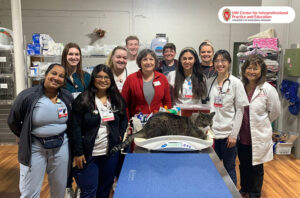
Leadership Profile: Director, Center for Interprofessional Practice and Education
The University of Wisconsin–Madison health sciences schools invite applications and nominations for the position of Director of the Center for Interprofessional Practice and Education.
The Opportunity
The University of Wisconsin–Madison Center for Interprofessional Practice and Education (CIPE) was established in 2016 with a mission to work collaboratively locally, nationally and globally to champion, integrate and advance interprofessional practice and education to achieve the Quintuple Aim: better population health, better patient care, better value, better provider work experience and better health equity.
The center’s setting within a top-tier university renowned for its health sciences programs is key to success. The center is supported by and fosters connections between the UW–Madison Office of the Provost and the university’s four health sciences schools: the School of Medicine and Public Health, School of Nursing, School of Pharmacy and School of Veterinary Medicine. Its vision is to transform health care through interprofessional practice, education, and research. Since its inception, CIPE has worked to engage students, faculty, staff, practitioners, partners and community members and groups with innovative programming that spans practice, education and research, and pulls together individuals from across disciplines and health professions. These partnerships have promoted scholarship and sustainable programming.
In the educational realm, more than 5,500 students from 10 programs have participated since 2018 in interprofessional education activities CIPE offers in collaboration with its school/program partners. These include competency modules, a healthy aging initiative, knowledge exchange series, scholarships, an IPE path of distinction program option and more.
The center’s research and scholarship focus on the evaluation and dissemination of the impact of interprofessional practice and education on learners in its programs, as well as patient, community and population outcomes that stem from interprofessional care. There are also opportunities for students to receive fellowships and scholarships to support their work.
CIPE serves as a central hub at UW–Madison and beyond by establishing broad partnerships that result in exemplary interprofessional practice and education. The center’s organizational structure of committees and taskforces represents the broad swath of health professions and outreach units on the UW–Madison campus and beyond. National and global partners include the American Interprofessional Health Collaborative, Big Ten IPE Academic Alliance, National Center for Interprofessional Practice and Education, and the Global Network for Interprofessional Education and Collaborative Practice Research.
The center’s highly successful five-year Strategic Directions plan is sunsetting, and the next director will have the opportunity to build on the center’s progress and shape its bright future. The director will lead the center’s team and further its mission to work collaboratively locally, nationally and globally to champion, integrate and advance interprofessional practice and education to achieve the Quintuple Aim.
The successful candidate will be an innovative leader in interprofessional practice and education with proven skills in building relationships and partnering across the health professions.
Organization Overview
UW–Madison
Since 1848, this campus has been a catalyst for the extraordinary. As a public land-grant university and one of the most prolific research institutions in the world, UW–Madison is home to those who are driven by a desire to both explore new worlds and to apply new ideas to real-world problems.

With a total annual budget of over $3.7 billion, including more than $1.52 billion in annual research expenditures, UW–Madison has been in the top 10 in national research spending every year since 1972. The campus is home to more than 25,000 faculty and staff and 50,000 undergraduate, graduate and professional degree students. Members of the student body represent all 50 states and 116 countries. The university was ranked the number two public university Washington Monthly’s 2023 College Guide and Rankings and is ranked 12th among public institutions in U.S. News & World Report’s 2023-24 rankings of best colleges.
The Wisconsin Idea — the principle that the university should improve people’s lives beyond the classroom — has been guiding the efforts of UW–Madison Badgers for more than a century. The university has been dedicated to studying poverty and social inequity for 50 years, is consistently ranked among the top large schools for producing Peace Corps volunteers and boasts 20 Nobel Prize winners among its faculty and alumni.
For me, the Wisconsin Idea is the clear vision for what a public university is and should be. I want to celebrate it as a national and even global model for why public universities matter. It’s my goal to keep our teaching, research, and outreach missions strong, to support our students, and to make the university a more diverse and inclusive place to live, learn, and work.
– Jennifer L. Mnookin, Chancellor
School of Medicine and Public Health
The University of Wisconsin School of Medicine and Public Health (SMPH) is recognized as an international leader in education, research and service. Founded in 1907, it transformed into the nation’s first School of Medicine and Public Health in 2005 to integrate the principles and power of interwoven medical and public health approaches in all of its missions. With more than 5,500 employees, including over 2,000 faculty, the school’s engagement spans the entire state of Wisconsin and includes a deep commitment to improving population health. This commitment manifests itself in innovative models that serve as paradigms for the rest of the country.
Members of the school rapidly translate discovery into application and continually foster synergies between clinical care, education and research. Consistently ranked among the nation’s top medical schools, the school has established high-performance academic programs that are intentionally distributed across the entire spectrum of academic medicine.
School of Nursing
The University of Wisconsin–Madison School of Nursing is the leading nursing research institution in Wisconsin and a crucial part of the state’s health care system. Situated in the health sciences sector of campus with the School of Medicine and Public Health and the School of Pharmacy, the School of Nursing collaborates with scientists and renowned researchers across the UW–Madison campus, the nation and the world.
Translational in nature and grounded in practical application, research at the School of Nursing has an immediate impact on Wisconsin’s communities, hospitals, clinics, schools and homes. The School of Nursing develops leaders for the profession and society — making discoveries, enhancing systems and improving health through research, education and practice.
The school has an enrollment of more than 1,000 students and offers the Bachelor of Science in Nursing (BSN), Doctor of Nursing Practice (DNP), and Doctor of Philosophy in Nursing (PhD) degrees, as well as continuing education and four certificate programs.
School of Pharmacy
The University of Wisconsin–Madison School of Pharmacy changes lives for a better world as pioneering minds at the heart of health care. A global leader in pharmacy education, research, service and professional development, the School of Pharmacy has educated the world’s finest pharmacists and scientists for more than 135 years. Its evolving curriculum, award-winning educational innovation and commitment to hands-on learning develop our students into future health care leaders. Its programs are grounded in the latest biomedical, pharmaceutical, social and clinical science, and the practical clinical skills to advance human health and patient care for diverse populations.
Inspired by the Wisconsin Idea, the renowned faculty and groundbreaking research labs and centers of the School of Pharmacy are united by a single mission: to enhance the health and quality of life of people in Wisconsin and around the world.
School of Veterinary Medicine
Founded in 1983, the UW School of Veterinary Medicine provides outstanding programs in veterinary medical education, research, clinical practice and service that enhance the health and welfare of both animals and people and contribute to the economic and environmental well-being of the state of Wisconsin, the nation and the world.
Consistently ranked among the leading schools of veterinary medicine in the country, the school is home to a medical teaching hospital, UW Veterinary Care, and four academic departments: Comparative Biosciences, Pathobiological Sciences, Medical Sciences, and Surgical Sciences. The school also provides graduate research training in core areas of animal and human health through its Comparative Biomedical Sciences Graduate Program.
School of Veterinary Medicine scientists hold international leadership in much of the research they conduct, yielding critical discoveries in areas as diverse as influenza, oncology and demyelinating diseases. Their findings are incorporated into curriculum, clinical practice and industry partnerships.
UW Health
UW Health is the integrated health system of the University of Wisconsin–Madison, serving more than 800,000 patients each year in the upper Midwest and beyond with more than 1,800 physicians and 24,000 staff across six main hospitals and more than 90 outpatient sites. The health system’s total system joint operating agreement revenues are $5.1 billion. UW Health is governed by the UW Hospitals and Clinics Authority and partners with UW School of Medicine and Public Health to fulfill patient care, research, education and community service missions. UW Health Hospitals, which includes University Hospital on the UW–Madison campus and UW Health East Madison Hospital on the east side of Madison, has been ranked No. 1 in Wisconsin for 12 years in a row by U.S. News and World Report. University Hospital is one among a select set of U.S. hospitals named to Newsweek’s “Top 100 Global” list, which includes hospitals in 11 countries around the world. American Family Children’s Hospital is also nationally ranked as a top children’s hospital. UW Health has been designated by the Human Rights Campaign Foundation as a Leader in LGBTQ Healthcare Equality in the Healthcare Equality Index for several years.
University of Wisconsin–Madison Center for Interprofessional Practice and Education
The University of Wisconsin–Madison Center for Interprofessional Practice and Education (CIPE) is a premier center with a vision to transform health care through interprofessional practice, education and research. Since being established eight years ago, in collaboration with its internal and external partners, CIPE has made significant progress toward championing, integrating and advancing interprofessional practice and education to achieve the Quintuple Aim at local, national and global stages.
Quintuple Aim:
- Better population health
- Better patient care
- Better value
- Better provider work experience
- Better health equity
The center has been highly successful in building and expanding how interprofessional practice and education is integrated and sustained across the university. A number of campus-wide education programs and initiatives have been developed, enhanced, piloted and implemented, including:
- UW IPE Path of Distinction (PoD)
- IPE Badger Program
- IPE Healthy Aging Initiative
- IPE Designation Program
- IPE Competency Modules
- IPE Knowledge Exchange Series
- Joint Dual IPE Distinguished Fellowship
- Mischler IPE Student Scholarship
- IPE Systematic Assessment
- Annual Report
The highly successful IPE Badger Program provides focused interprofessional practice and education academic training with fewer academic requirements than a typical degree and/or certificate program. Through the program, CIPE recognizes and awards formal digital “Badges” to learners who participate in and successfully complete designated IPE offerings and activities at UW–Madison and its partners. Examples include courses focused on fundamentals, leadership, teamwork, communication, ethics, empathy, dementia caregiving, motivational interviewing and more. To date, the Badger Program has awarded more than 1,900 badges.

Scholarship and evaluation are two top priorities that enable evidence-based programming at the center. This consists of evaluation of individual programs and large-scale work on the center’s overall impact and direction. For example, the IPE Healthy Aging Initiative uses a multi-phase approach to develop, implement and evaluate a customized micro-credential curriculum focused on dementia care. Pre- and post- evaluation data has shown that after the course, students exhibited significant improvement in their dementia knowledge, teamwork (in the areas of collaboration, coordination and partnership) and interprofessional socialization. In addition, the center and its partner programs have united to require that all students in partner programs complete the IPE Systematic Evaluation. Data show that the center’s programming helps students see more value in the knowledge of other professions, improve their interprofessional socialization and increase their appreciation for interprofessional work.
A next phase for the center is further developing its IPE Experiential Expansion Initiative, which is focused on integrating interprofessional practice and education into clinical and community placements. These placements will include structured and flexible IPE encounters, as well as telehealth and large-scale clinical simulations. By equipping students and their preceptors with ways to intentionally integrate IPE, the program’s goal is to have graduates enter the workforce practice-ready to lead IPE efforts in promoting the Quintuple Aim. A pilot program with the Wisconsin Area Health Education Centers (AHEC) took place in the summer of 2023 and provided students with an opportunity to learn with, from, and about each other regarding how improved collaboration in various health/social care fields can enhance the quality of health and social services.
Qualifications and Attributes of Leadership
The successful candidate will have a compelling vision for the future of interprofessional practice and education in a leading public academic institution and medical center and more than three years of interprofessional education and practice experience in a healthcare and academic institution. They should have a record of successful leadership and management in interprofessional education and practice, healthcare institutions and/or graduate academic health education programs. The director will possess proven leadership, management and program development skills, as well as an outstanding academic background, grant writing experience and evidence of passion for professional development and continued learning.

This position is being posted simultaneously across three position vacancy listings (PVLs); please note that only one vacancy exists. Having three position vacancy listings allows the hiring committee to consider candidates with both faculty credentials and non-faculty credentials for this position. Degree requirements are:
- Clinical Professor (IC009) or Clinical Associate Professor (IC010) or Clinical Assistant Professor (IC011) or Professor (CHS) (IC014) or Associate Professor (CHS) (IC015) or Assistant Professor (CHS) (IC016): Terminal clinical degree (DNP, DPT, DVM, MD, MGCS, MPA, MSW, OTD, PharmD) or other terminal degree (EdD, PhD)
- Teaching Professor (TL022) or Teaching Assistant Professor (TL055) or Teaching Associate Professor (TL056): PhD or other terminal degree, or a degree at least one level above the level of instruction, or otherwise approved as qualified by the Dean
- Administrative Director (Inst) (AD072): Terminal clinical degree (DNP, DPT, DVM, MD, MGCS, MPA, MSW, OTD, PharmD) or other terminal degree (EdD, PhD)
See each PVL for further information.
The person hired would have to be eligible for an appointment in one of our health professions schools: School of Medicine and Public Health, School of Nursing, School of Pharmacy or School of Veterinary Medicine. Which specific hiring department within a health sciences school may be contingent on the finalist’s area of specialty.
The Community
Located on an isthmus between two lakes, Madison is the capital city of the state of Wisconsin. Madison has been voted in the top 100 Best Places to Live in the USA (Liveability, 2023) and the #1 City for Most Successful Women Per Capita (Forbes, 2019). Madison is also:
City for Best Work-Life Balance (SmartAsset, 2022)
Best City for STEM Professionals (CEO World, 2020)
Best State to Practice Medicine (WalletHub, 2022)
Madison’s technology economy is growing rapidly, and the region is home to the headquarters of Epic Systems, Exact Sciences, American Family Insurance, American Girl (Mattel), Sub-Zero, and Lands’ End, as well as many biotech, health care IT and health systems startups.
The city of Madison and the University of Wisconsin–Madison acknowledge that they occupy ancestral Ho-Chunk land. The School of Medicine and Public Health recognizes the health inequities faced by Native communities and pledges to facilitate learning and action across all of its missions.
Madison is the second largest city in the state, with a city population of approximately 260,000 and regional population of over 1 million. The city is within easy driving range of Chicago and Milwaukee. Madison offers numerous unique neighborhoods and commercial areas including the Capitol Square, State Street, Willy Street, Shorewood Hills, Maple Bluff, and Hilldale. Suburbs and surrounding smaller communities include Sun Prairie, Middleton, McFarland, Verona, Cottage Grove, Waunakee, and Fitchburg.
Madison is home to one of the strongest local food scenes in the country with several James Beard Award winners, gastropubs, and farm-to-table restaurants. From April to October, the Capitol Square hosts the impressive Dane County Farmers’ Market, the largest producer-only farmers’ market in the country. The city is rich with cultural offerings such as the Overture Center for the Performing Arts, Orpheum Theatre, Concerts on the Square, Jazz at Five, UW–Madison Mead Witter School of Music and Hamel Music Center, Madison Symphony Orchestra, Madison Opera, Madison Ballet, UW–Madison Chazen Museum of Art, Madison Museum of Contemporary Art, Wisconsin Historical Museum, and Madison Children’s Museum, among others.

The city has a dedicated athletics fanbase which largely centers around the University of Wisconsin–Madison. Sports venues include Camp Randall Stadium, the Kohl Center, LaBahn Arena, Wisconsin Field House, and the Alliant Energy Center. Madison is home to Forward Madison FC, the first professional soccer team in the city, as well as the Madison Mallards, a college wood-bat summer baseball league team. Marquee endurance sports and specialty sporting events include IronMan Wisconsin and IronMan 70.3, Reebok CrossFit Games, Madison Marathon, and many national and international championship competitions.
Application Process
Nominations
Please send nominations to:
Barb Anderson, MS, and Melgardt De Villiers, BPharm, MSc, PhD, PgDip
Co-chairs of the Director, Center for Interprofessional Practice and Education Search Committee
c/o Benjamin Schultz-Burkel
DMA, 4299C HSLC, 750 Highland Avenue, Madison, WI, 53705-2111
drbenjamin.schultzburkel@wisc.edu
Applications
Select the applicable button to apply through the Jobs at UW portal. Candidates must apply through this portal to be considered as a candidate. Applicants will be asked to upload a CV and personal statement/cover letter detailing:
- Your interest in this position and vision for the Center for Interprofessional Practice and Education
- A summary of your background and qualifications for this position
Diversity, Equity and Inclusion
Diversity is a source of strength, creativity, and innovation for UW–Madison. We value the contributions of each person and respect the profound ways their identity, culture, background, experience, status, abilities, and opinion enrich the university community. We commit ourselves to the pursuit of excellence in teaching, research, outreach, and diversity as inextricably linked goals. The University of Wisconsin–Madison fulfills its public mission by creating a welcoming and inclusive community for people from every background — people who as students, faculty, and staff serve Wisconsin and the world.
Confidentiality
Unless confidentiality is requested in writing, information regarding applicants must be released upon request. Finalists cannot be guaranteed confidentiality. The University of Wisconsin is an equal opportunity, affirmative action employer.
Deadline
To receive full consideration, please apply by Feb. 12, 2024. The position will remain open and applications may be considered until the position is filled.
More Information
For more information, visit med.wisc.edu and cipe.wisc.edu. To learn more about life in the city of Madison, visit madison.wisc.edu.
Apply to Teaching Professor Listing
Apply to Clinical Professor or Professor (Clinical Health Sciences) Listing